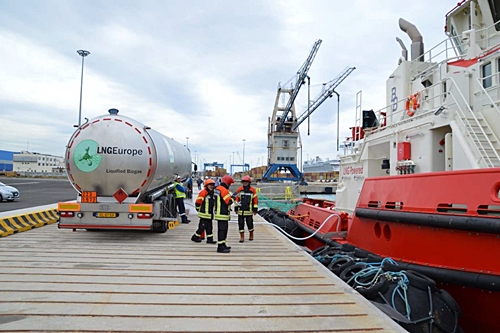LNG likely to keep heading to Europe this winter, Cheniere executive says
(Reuters) - Cheniere Energy Inc, the largest U.S. LNG exporter, which shipped 70% of its production to Europe this year, said current market prices suggest volumes will continue to head to Europe during winter.
Corey Grindal, Cheniere executive vice president for worldwide trading, told Reuters that the upcoming winter "could be really, really tight" with limited global LNG supply.
"70% of what we produce has gone to Europe this year. At the current pricing, the market says that this should continue to go to Europe," he said in an interview at international Gastech conference in Milan.

Europe has become a prime market for LNG, attracting massive volumes from all around the world. Countries have turned to LNG as Russia, Europe's major gas supplier, has cut flows following Western sanctions on Moscow over the Ukraine war.
As a result, Europe is facing its worst ever gas supply crisis, with energy prices soaring and both the European Union and Britain forced to cap prices and find ways to reduce consumption, including via rationing.
LNG prices have lurched from record lows under $2 per million British thermal units (MMBtu) in 2020 to record highs of $57 in August. Benchmark prices currently stand at about $55 per MMBtu.
Recent data from pricing agency Spark Commodities for cargoes shipped from Cheniere's Sabine Pass LNG export plant in Louisiana, on a free-on-board (FOB) basis, also suggest that netback forward curves are currently pricing in that spot U.S. LNG will be more profitable to send to Europe rather than Asia for the next 12 months.
Netback is the effective price earned by a producer of LNG at a particular point.
Cheniere, which has sold out around 90% of its LNG production this year in long-term deals and struck deals for future output, is a destination-flexible seller of LNG. This means clients who buy LNG from the company have the freedom to sell it anywhere, and many of them choose the highest paying markets.
A revival in LNG demand from China may add to Europe's energy crunch, and would fuel an intense competition for the supercool fuel in an already tight market, Grindal said.
"At the end of the day, what's going to decide how tight the market will be is how cold it is and how government policies, industry rationing work. ..There is still a lot of game to play," Grindal said.
He said signing long term contracts is key for Europe to secure uninterrupted LNG supplies in the long term.
"Without long term contracts, we are not going to take the risk of building billions of dollars worth of infrastructure," he said.
LNG producers favour long-term contracts, which generally run between 10 and 25 years, so they can manage commitments for capacity expansion at capital-intensive projects and to maintain revenue stability.
In the United States, producers need long-term contracts to finance their liquefaction projects, typically selling a proportion of upcoming production to traders, who have the freedom to sell it to Asia or Europe.
About 70% of LNG trade globally is estimated to be sold via long-term contracts, but in Europe spot and short-term contracts represent around 45%-50%. The European Commission says long-term contracts could inhibit free flows of gas in Europe.
In August, Cheniere announced second-quarter profit that topped forecasts, and raised its full-year earnings outlook, on strong LNG demand, posting net profit to common stockholders of $741 million, or $2.90 per share, compared with a loss of $329 MM, or $1.30 per share, a year earlier.
(Reporting by Marwa Rashad; Editing by Jane Merriman)

- RWE strengthens partnerships with ADNOC and Masdar to enhance energy security in Germany and Europe
- TotalEnergies and Mozambique announce the full restart of the $20-B Mozambique LNG project
- Venture Global wins LNG arbitration case brought by Spain's Repsol
- KBR awarded FEED for Coastal Bend LNG project
- Norway pipeline gas export down 2.3% in 2025, seen steady this year



Comments